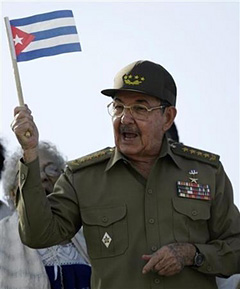 |
 |
 |
 News from Around the Americas | December 2006 News from Around the Americas | December 2006  
Raul Castro Proposes Negotiations to Washington
 Sara Roumette - Le Monde Sara Roumette - Le Monde


| | Raul Castro, chief of Cuba's army and brother of Cuba's President Fidel Castro, waves a Cuban flag during a military parade in commemoration of the 50th anniversary of the Cuban revolution in Havana, December 2, 2006. (Carlos Barria/Reuters) |
The Cubans gathered around the Revolutionary Square on Saturday, December 2, heard Raul Castro's voice follow the gun salvoes with disbelief. Incredulous, because that meant Fidel Castro's absence from this parade devoted to 50 years since the beginning of the Cuban revolution and to his own eightieth birthday; and since - in spite of contradictory rumors about the state of his health - many remained persuaded that the Cuban "lider" would do everything to appear on this day, symbolic of the revolution he led.

Strangely, even though Fidel's name was the true slogan of the march, repeated in rank after rank and on sign after sign by the 300,000 people convened for the parade, neither Raul Castro nor the Cuban national media publicly evoked this so-very-present absence, leaving the Cubans disconcerted.

On the other hand, in his brief speech, Raul Castro touched on a sensitive issue that had up until then belonged to the sphere reserved to his brother: relations with Washington. "I take advantage of the opportunity to express once again our availability to resolve the prolonged differences between the United States and Cuba around a negotiating table," he declared, "based on the principles of equality, reciprocity, non-interference, and mutual respect."

It's the second time in less than four months that Raul Castro has publicly mentioned this subject, thus proposing to put an end to almost fifty years of mutual hostility and latent Cold War.

Strategic Discourse

For some dissidents, Fidel Castro's absence and this strategic discourse by his brother mark a real turning point: "This will remain a kind of 'D-Day,' the moment of inflection for a new stage," declared Manuel Cuesta Morua, leader of the illegal socialist group Arco Progresista, to the news agency EFE. "It's the political confirmation of the succession, after a full-fledged speech by the head of state," he added.

More reserved about the possibilities of this dialogue, former political prisoner and independent economist Oscar Espinosa Chepe deems that "the two parties must lower the rhetorical levels, which are not helpful at all" to a possible transition.

The United States answered Raul Castro Saturday by rejecting any possibility of discussion: "The dialogue about the island's democratic future must take place between the Cuban regime and the Cuban people," declared a State Department spokesperson, before adding: "As we have said, the deepening of our relationship depends on that dialogue."

If, with respect to Cuban internal politics, this Saturday undoubtedly marks an irreversible step in the succession process now under way, the American response tends to show that the United States is sticking to the intention it has expressed in the past not to negotiate with either Castro: neither Fidel nor Raul.
Castro's Replacements
Le Monde

One new star takes its place in the firmament of the Latin American "revolution" while another fades. Hugo Chavez has been re-elected president of Venezuela for the second time since 1998, with 61 percent of the votes. At the same time, Castro supporters celebrated the 50th anniversary of Fidel's return to Cuba. But the "Lider Maximo" was absent, even though he had asked that the festivities planned for August 13 for his eightieth birthday be rescheduled to December 2nd because of his hospitalization. His absence from the military parade is more freighted with meaning than any medical bulletin. Fidel Castro has not reappeared in public in over four months. Cuban television showed 'im several weeks ago, painfully walking down hospital hallways. Since then, nothing. Although officially his brother Raul is only taking care of the interim, Fidel's return to power is ruled out.

Cuban television had also shown how the old Cuban dictator had passed the torch of combat against "American imperialism" to Hugo Chavez. Laying claim to the double paternity of Bolivar and of Castro, the Venezuelan president has resumed the tradition of fiery speeches against the United States. Yet, he does not content himself with rhetoric alone. Thanks to his oil revenues, he helps the radical Latin American left take power, not through armed struggle as during the 1970s to 1980s, but through the ballot box. He has succeeded in Bolivia, Ecuador, and to a certain extent, in Nicaragua.

His ambitions do not clash with Washington's policies only. From Peru to Chile, a more moderate left, closer to European social democracy than to the former Sierra Maestra guerrillas, is attempting to reconcile independence vis-à-vis the United States, economic development and democracy. Mr. Chavez learned that at his own expense with the failure of the Venezuelan candidacy for the UN Security Council.

Be that as it may, Latin American countries' policies cannot define themselves solely in opposition to the United States. Thus it is that Raul Castro himself seemed in his official speech on Saturday, December 2nd, to make a gesture in Washington's direction. He declared himself ready for "negotiations ... on the basis of principles of equality, reciprocity, non-interference and mutual respect." Interpretations diverge. Was it a simple slogan or a real overture? In any case, it is certain that the prospect of Fidel Castro's approaching disappearance can only fuel the struggles for influence among the leadership circles. Raul Castro belongs to the "Chinese" tendency, interested in an economic - but not any political - reform of the system. That, unfortunately, would not be incompatible with the repression of opposition, which has never ceased.

Translation: t r u t h o u t French language correspondent Leslie Thatcher. | 
 | |
 |



